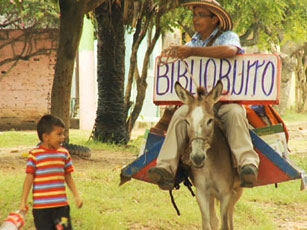It can be hard to define what a hero is. What are the criteria for being an inspiration to your community and to the world? Is it a sense of goodness that is not often seen in the everyday world? Or is it the ability to put others and their struggles before yours? Can it be a selflessness to work to be a voice to those who have none? In fact, true heroism is an equal combination of all of these things: the drive to help those in need, the need to be the voice of those that have none and real goodness. The man from the film Biblioburro is in fact one of these people who are the definition of what it takes and what it means to be a hero. Luis Soriano Bohorquez is a man who puts others before himself and he does so for the greater good of his community and those who will inherit the world we will leave behind, our children.
 |
Luis Bohorquez exemplifies true heroism because he works hard to unite two worlds that don’t often get the chance to coincide: literacy and youth in the mountains of Colombia. For ten years, Bohorquez has been teacher and librarian of a school called La Gloria. He travels far and wide, sometimes as long as 8 hours at a time, to bring books to young children in the mountains of the town that surround his. Bohorquez runs the only library for miles around, which also happens to be his home and because some of the people living in the villages of those mountains are extremely poor, they do not have the luxury of providing a full education to their children. So, in an effort to ensure an equal opportunity for all the children, and to combat what he calls “farmer’s ignorance”, he loads his burro up with dozens of books at a time and he travels to these villages and teaches the local children how to read.
Something this simple may not seem like something that can be defined as very heroic. However, when you consider a person like Bohorquez’s true intentions, one cannot see him in any other light than a hero’s. Bohorquez dedicates his life to teaching the poor children of his town to read because he feels it necessary to give them the best tool they can have as adults, an education. Not only is an education necessary to these youth, but the ability to understand the world they live in and therefore to understand their “rights, duties and commitments” is what is truly necessary. Without the knowledge of who they are and what they are entitled to, these youth could be at a great disadvantage. Yet he wants them to know their rights and privileges so that they are informed, but most of all so that each is in control of their own destiny.
Apart from this, Luis Bohorquez is a paragon of pure goodness and, therefore, a true hero. Arguably, he does not need to go that extra mile to bring literacy and a love for learning to these children he helps. No one asks him to do it and no one is demanding results from his actions. However, out of some place noble, and definitely someplace innately good, Bohorquez rises above the occasion and does only what he considers the bare minimum of what his community needs. He doesn’t read to children out of obligation, he does so out of a certain kind of necessity, his own kind of commitment. Bohorquez believes that it is his life’s work to “be useful to the community that [he] belongs to”.
There is no doubt that Luis Soriano Bohorquez exemplifies what we universally consider to be a hero. His desire to teach and the measures he goes to in order to bring literacy to the underprivileged youth of Colombia are admirable and nothing short of inspirational. Bohorquez is indeed a hero because he goes above and beyond to ensure that the future of the youth of Colombia is bright and just what his school’s name purports, definitely “glorious”.
Page created on 7/9/2015 3:30:58 PM
Last edited 10/17/2019 8:51:24 PM
